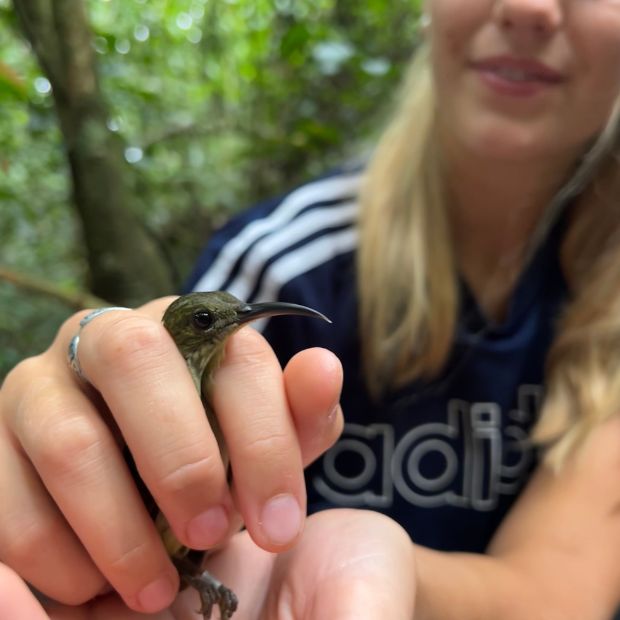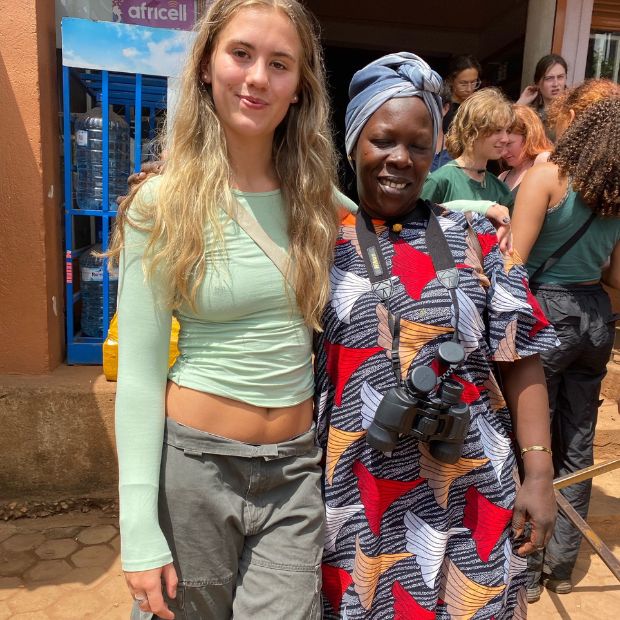Hear from Tilly-Rose Wilkin, final year Wildlife Conservation with Zoo Biology student.
Which fieldtrips have you participated in so far as part of your course?
I’ve participated in several. Ones where I’ve stayed for several days include Castlehead, Blencathra, Millport, and Uganda. Day field trips included visits to 5 different zoos, the Peak District, Martin Mere, and out in Peel Park.
The trips to Castlehead and Blencathra consisted of learning techniques to measure biodiversity, e.g. using humane mouse traps, pitfall traps, beat sticks and many other methods. These trips lasted around three days each.
Millport was amazing, it’s an Isle near Glasgow. This trip was based on marine biodiversity. So, we did multiple transects along the beaches and rocky shores as well as completing small scientific trawls along the benthic zones in the sea on a boat.
For one of the zoo visits, we measured the behaviour of an animal of our choice. We sat there watching a specific animal, recorded the data, and then compared the best data collection method for our report. After each of these field trips, we had to them write up a scientific report based on the findings.

Tell us a little about your Uganda trip.
We travelled to Uganda as part of our Tropical Ecology and Conservation module. Our role was to collect data in the Budongo Forest Reserve and write a scientific report on it when we got back. Besides being a researcher, we had dedicated time to appreciate the culture and sights of Uganda.
What sort of activities did you take part in during your Uganda trip?
In the first week, we did a lot of sightseeing, including river Nile tours, safaris, cultural experiences, and Murchison Falls viewpoint. We visited the Budongo eco lodge where our lecturer had habituated chimps in 1994 and had a forest walk (which was also my 21st birthday).
In the second week, we headed to the Budongo Conservation Field Station where we collected data for birds, herptiles, trees, and fish. Lastly, we finished by staying at this amazing glamping place where we visited Entebbe (Uganda Wildlife Conservation Education Centre).

What was your favourite moment of your experience at Uganda?
One of the most memorable experiences for me was during our small river boat tour. As the animals frequently visit the river to drink etc, we had a really good view of all the animals. We had a really close encounter with a herd of elephants, which was genuinely incredible. The first-time hearing chimps calling at the research base and then going out to see them all in the trees was also phenomenal.
What was your accommodation like there?
We stayed in 6 different places. Most of the places were dormitories of about 4-6 people with shared toilets and showers in a separate block. The Budongo field station was literally a hole in the ground (it was quite funny though), it was completely compensated for by our alarm clocks being chimps calling in the morning. There were also blue monkeys, colobus and bush buck roaming around the station.
In another place, I had a room to myself with an ensuite. When we stayed in Red Chilli base camp, there were large tents with two beds. Red Chilli had amazing wildlife within the camp, we had baboons in and around our tents, warthogs, hippos (although we didn’t see one). In our final destination, in Entebbe, we had amazing teepees with fairy lights with little vervet monkeys playing on them.

What skills have you developed from your field trip?
We learnt so much about Ugandan culture and plenty of data collection and surveying techniques. Some of the things we learnt, but not limited to:
- Visual and Acoustic Encounter surveys focused on amphibians and reptiles
- Point Count Surveys to study avian populations
- Mist Netting techniques
- Measuring molting patterns in birds
- Soil sampling and analysis
- Tree surveying for carbon storage estimates
- Rapid Forest Assessments
- Strip Line Transects for vertebrate studies
- River Depth profiling
- Utilisation of a variety of fish sampling methods, including lobster traps, larger nets, and custom-made small traps).
We also visited the Ugandan Wildlife Authority funded by the Uganda Conservation Foundation. We learnt all about the operations behind prosecuting poachers, monitoring the animals on the reserve, and collecting snare traps etc. The sheer amount of traps the group had collected in such a short space of time was staggering.
How has taking part in field work helped you in your studies and would you say they are an important part of your course?
I’d say the work we did in Uganda was the most meaningful work I’ve done in my degree so far. We learnt so many data collection and surveying techniques and solidified how to write a good scientific report. Alongside the whole trip, we had to make a field book which was practically journaling what we did everyday to consolidate what we had learnt. Although we got marked on it, it was amazing to do as I have that forever now. Most importantly, I learnt a lot about what I want to do in the future.

Do you have any other thoughts or comments you’d like to share with us about your trip?
I’d say if you can afford it as I know it isn’t accessible to all, 100000% go! Anyone can go to Uganda if they wanted to, but having a lecturer who lived there for years, who knew so much about the area, made it a next level experience. We also met amazing people including Sippy and Sauda. Sauda was the first female guide in Uganda and we had the pleasure of her guiding us for three whole days.